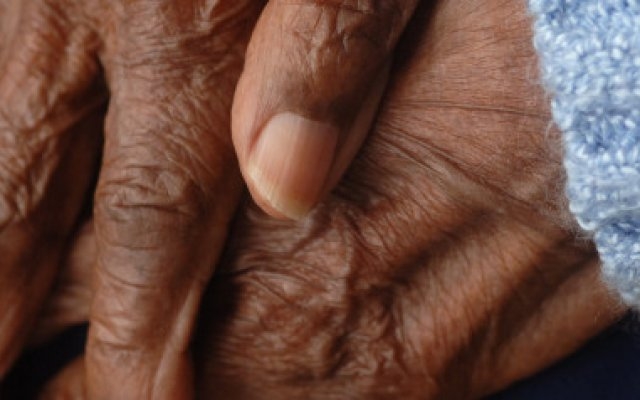Urgent call for gov’t to prioritise age-related diseases
Feature Article

Ageing is a sensitive stage of life. According to the WHO (World Health Organisation), the aged are persons 60 years and above. The Ghana 2010 Population and Housing Census recorded 1.2 million Ghanaians are aged 65 years and above. As life expectancy in Ghana has improved to 63.74 years, the aged population is bound to increase in the coming years. These individuals have extensive knowledge, values and priceless experience that younger generations could tap from having a positive impact on the country’s development.
However, the ageing process itself is full of inevitable, irreversible decline of the body and mental activities such as thinking, understanding, remembering, and learning. This makes most of our elders vulnerable to developing severe illness, serious changes in their character, mental problems, changes in how they can manage their daily chores. They are thus rendered unable to guide the younger generations.
Among the types of diseases affecting the aged and causing weakness are neurodegenerative disorders. They cause a slow death of nerves resulting in problems with the movement called ataxia and/or mental functioning called dementias. Among the common ageing-related neurodegenerative diseases include Alzheimer’s, Parkinson’s disease, dementia, etc. Treatment for these conditions is not readily available in the country. For the first time in Ghana, Madopar, levodopa Benserazide combination for the treatment of Parkinson’s disease has been recently been registered and made available. Care of the aged especially when they also have these weakening illnesses is a big task, and lack of awareness and understanding of these changes in the elderly may lead to neglect or abuse by their family members and delay in seeking help or taking them to the clinic.
Our elderly deserve and desire a life with good health, dignity, economic independence and finally a peaceful death. They long for care, love and affection.
Family Medicine is a branch of medicine assigned to care for individuals throughout the span of life from cradle to grave. Family physicians have therefore been trained in the care of the elderly and are keenly aware of the various needs of this age group as well as the best places for their care.
Members of the Society of Family Physicians of Ghana (SOFPOG) are front liners in the management and care for most of these aged persons across the length and breadth of Ghana. We intend to create public awareness on these neurodegenerative diseases in our elderly which are a common cause for hospital visits in our community. SOFPOG seeks to educate health care providers, caregivers, as well as the sufferers on the nature, progression and management of these conditions.
It is in line with this agenda that a programme on Parkinson’s disease, one of the neurodegenerative disorders common in the elderly and in our environment was organised for stakeholders in Kumasi. At the end of the lecture, it is expected that our audience will acquire the requisite skills and knowledge to accurately diagnose and manage Parkinson’s disease, explore available resources and support needed to enhance their journey so that we can all be ambassadors in our respective areas for the care of these patients.
We want Ghanaians to understand that the journey of a patient with Parkinson’s disease is full of anxiety, uncertainty and is very stressful and would require all hands on deck to ensure their journey is bearable.
To be able to meet our goal of carrying out this enormous task SOFPOG will need the support of the general public, government, corporate organizations, support groups, research groups, and NGOs especially those with the interest in the care of patients with neurodegenerative disorders to partner with us to make life comfortable and enjoyable for these senior citizens whose sweat and toil have brought this nation thus far.
We want the government to prioritize these age-related diseases and ensure that their medications are put on the essential drug list and made freely available and affordable for patients to buy or covered under the National Health Insurance Scheme.
Colleagues and the Press, I will conclude by re-emphasising that the aged population is projected to increase in Ghana. We must, therefore, be armed with the relevant knowledge and skills to make this unique closing chapter of life as comfortable as practicable.
By: Dr Emmanuel Ati, President of the Society of Family Physicians of Ghana (SOFPOG); 0208623632/0243225772
Email: [email protected]
However, the ageing process itself is full of inevitable, irreversible decline of the body and mental activities such as thinking, understanding, remembering, and learning. This makes most of our elders vulnerable to developing severe illness, serious changes in their character, mental problems, changes in how they can manage their daily chores. They are thus rendered unable to guide the younger generations.
Among the types of diseases affecting the aged and causing weakness are neurodegenerative disorders. They cause a slow death of nerves resulting in problems with the movement called ataxia and/or mental functioning called dementias. Among the common ageing-related neurodegenerative diseases include Alzheimer’s, Parkinson’s disease, dementia, etc. Treatment for these conditions is not readily available in the country. For the first time in Ghana, Madopar, levodopa Benserazide combination for the treatment of Parkinson’s disease has been recently been registered and made available. Care of the aged especially when they also have these weakening illnesses is a big task, and lack of awareness and understanding of these changes in the elderly may lead to neglect or abuse by their family members and delay in seeking help or taking them to the clinic.
Our elderly deserve and desire a life with good health, dignity, economic independence and finally a peaceful death. They long for care, love and affection.
Family Medicine is a branch of medicine assigned to care for individuals throughout the span of life from cradle to grave. Family physicians have therefore been trained in the care of the elderly and are keenly aware of the various needs of this age group as well as the best places for their care.
Members of the Society of Family Physicians of Ghana (SOFPOG) are front liners in the management and care for most of these aged persons across the length and breadth of Ghana. We intend to create public awareness on these neurodegenerative diseases in our elderly which are a common cause for hospital visits in our community. SOFPOG seeks to educate health care providers, caregivers, as well as the sufferers on the nature, progression and management of these conditions.
It is in line with this agenda that a programme on Parkinson’s disease, one of the neurodegenerative disorders common in the elderly and in our environment was organised for stakeholders in Kumasi. At the end of the lecture, it is expected that our audience will acquire the requisite skills and knowledge to accurately diagnose and manage Parkinson’s disease, explore available resources and support needed to enhance their journey so that we can all be ambassadors in our respective areas for the care of these patients.
We want Ghanaians to understand that the journey of a patient with Parkinson’s disease is full of anxiety, uncertainty and is very stressful and would require all hands on deck to ensure their journey is bearable.
To be able to meet our goal of carrying out this enormous task SOFPOG will need the support of the general public, government, corporate organizations, support groups, research groups, and NGOs especially those with the interest in the care of patients with neurodegenerative disorders to partner with us to make life comfortable and enjoyable for these senior citizens whose sweat and toil have brought this nation thus far.
We want the government to prioritize these age-related diseases and ensure that their medications are put on the essential drug list and made freely available and affordable for patients to buy or covered under the National Health Insurance Scheme.
Colleagues and the Press, I will conclude by re-emphasising that the aged population is projected to increase in Ghana. We must, therefore, be armed with the relevant knowledge and skills to make this unique closing chapter of life as comfortable as practicable.
By: Dr Emmanuel Ati, President of the Society of Family Physicians of Ghana (SOFPOG); 0208623632/0243225772
Email: [email protected]
Source: David Apinga





